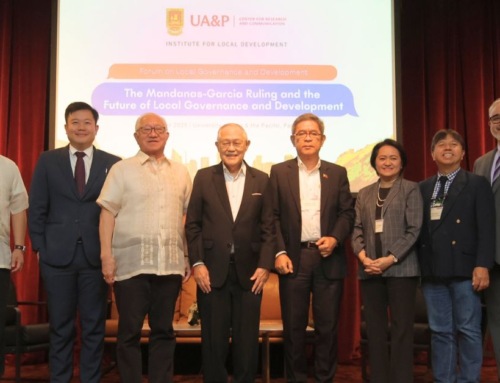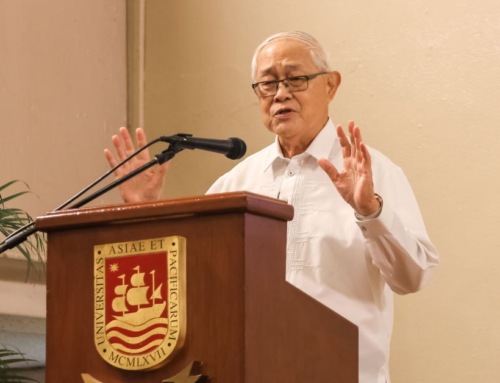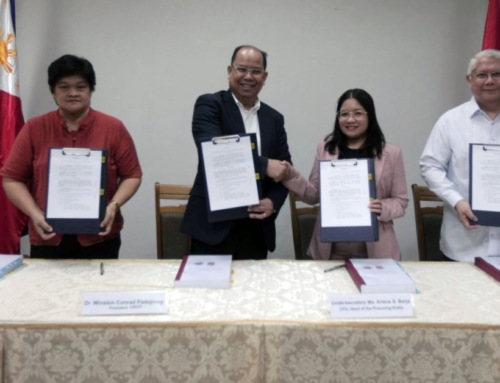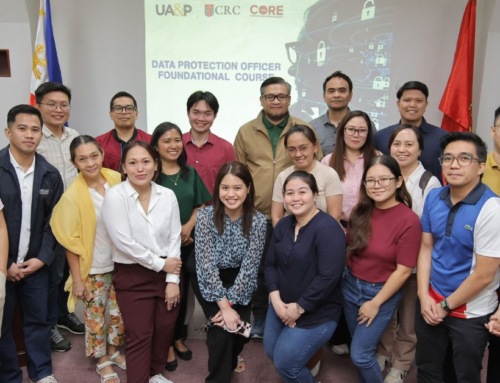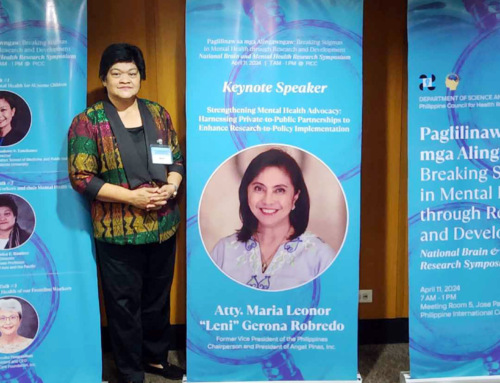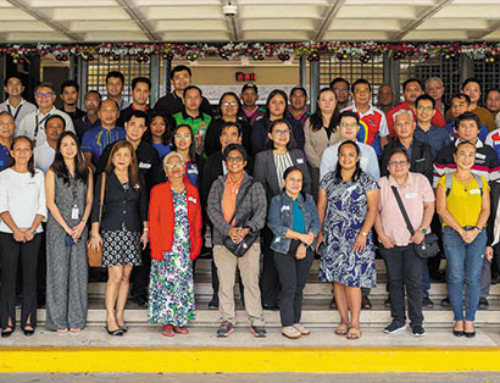Pasig City — If the Philippines wants its agricultural production to be efficient, then it needs to find more imaginative ways of helping the Philippines’ many small farmowners to work together, says eminent Filipino economist Dr. Bernardo M. Villegas in a recently released video from the Center for Research and Communication, where he answered audience questions after a briefing on “The Philippine Economy as a Top Emerging Market.”
One of the most important things the Philippines has to address in its agriculture sector is to fix the issues brought about by the improper implementation of the country’s agrarian reform program, which is enshrined in Article VIII, Section 4 of the Philippine Constitution – the constitution Villegas himself helped frame as a delegate to the 1987 constitutional convention.
“Now that we have millions of hectares in the hands of small farmers, we have to find ways of re-consolidating those farms without taking away their ownership,” he says. “There are ways now of re-consolidating, but this requires the government to be imaginative in how to allow that re-consolidation of farms.”
Coconut, Sugar, and economies of scale
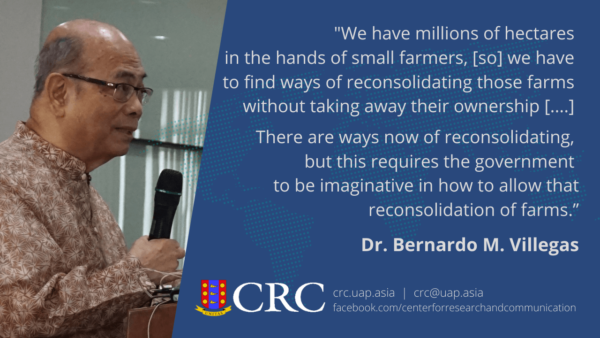
Villegas cites the Philippines’ sugar industry is one area where this this need is clearly demonstrated, comparing it to sugar production in Taiwan to make his point.
“You cannot have productivity in sugar with each [farmer] having five hectares and trying to farm on his own,” he says. “In sugar, you need large farms to be able to mechanize. I always cite the example of Taiwan, which did a tremendous job of agrarian reform in the last century when they split up their farms. They exempted sugar because they knew sugar needs economies of scale.”
“We have to re-consolidate a lot of those farms especially in Western Visayas, which is one of the most productive eras for sugar.”
Villegas also cites the Philippine coconut industry as a sector where economies of scale are important. He says producers need scale for “processing their output and coming out with higher value products like coconut water coconut milk – not just staying at the copra and coconut oil level, which are very low value.”
“They had land but nothing more.”
Villegas notes, though, that the problem springs from faulty implementation of land reform in the Philippines, not from the idea of agrarian reform per se.
“The big failure of agrarian reform was not the distribution of the large farms into small units. [This] was needed for social justice.
The big failure of the agrarian reform program […] was that after giving each farmer one to two hectares each, they literally abandoned them to their resources. And they became even poorer than before, because they had land but nothing more.”
“This requires the government to be imaginative”
Expanding further on his thoughts, Villegas shared some of the ways that he thought this re-consolidation could be achieved.
One way, he says, is “through the nucleus estate system of Malaysia,” referring to the Nucleus Estates and Smallholders (NES) scheme which has been in place for Malaysia’s Palm Oil industry since the 1970s.
The Malaysian system involves the government overseeing contracts by which small farmers lease their lands to larger companies or co-operatives, which then uses the land for large scale production. The government needs to be there to make sure that the smallholders have an even playing field when dealing with the corporations.
Yet another way is to encourage the establishment of “corporatives” – to encourage corporations to reach out smallholders so that they can produce a crop together so that they can band together and produce crops collaboratively, the way co-operatives and their members do.
“A lot can be done by farm co-operatives”
Several of the attendees at the briefing then followed up by asking Dr. Villegas whether he thought farm co-operatives had a role to play in this reshaping of Philippine agrarian reform.
“Oh, very much,” Villegas then replied. “When I talk about re-consolidating the farms, a lot can be done by farm co-operatives. They can actually unite and then work with a large corporation, [which] will [then] deal with the co-operatives rather than individually with each farmer. And that would actually facilitate the consolidation.”
“I hope to see more and more co-operatives addressing that problem of re-consolidating those small units, so that they can work with the large investors in areas like cacao production, palm oil, and coffee, not to mention the whole coconut industry.”
Dr. Villegas serves as Research Director for the Center for Research and Communication, a research and consultancy organization that specializes in linking corporations and organizations around the world to business opportunities in the Philippines. He is also the current holder of the CRC Professorial Chair on Social Economics. His briefing on “The Philippine Economy as a Top Emerging Market” was part of the latest CRC International Investor Roadshow, the video for which was recently released by the CRC. • | RE de LEon | CRC ||
_______________________________
To find out more about CRC, send an email to [email protected], or follow us on LinkedIN at linkedin.com/company/centerforresearchandcommunication. You can also find us on Facebook at www.facebook.com/centerforresearchandcommunication. The complete roadshow video is available at https://crc.uap.asia/2020/12/22/video-roadshow-phtopmarket/.

